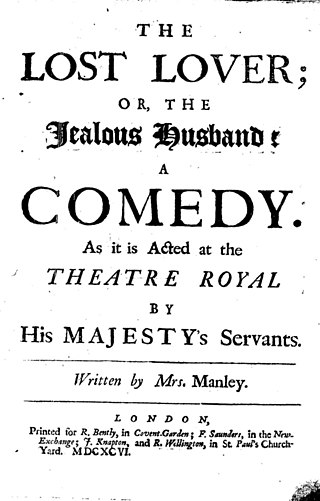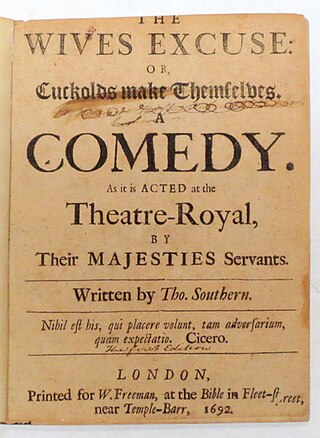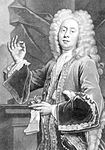
An Evening's Love, or The Mock Astrologer is a comedy in prose by John Dryden. It was first performed before Charles II and Queen Catherine by the King's Company at the Theatre Royal on Bridges Street, London, on Friday, 12 June 1668. Samuel Pepys saw the play on 20 June of that year, but did not like it; in his Diary he called it "very smutty."

The Lost Lover; or The Jealous Husband: A Comedy, Delarivier Manley's first published play, was performed in March 1696 at Theatre Royal, Drury Lane. The performance ran only three nights.
A Plot and No Plot is a 1697 comedy play by the English writer John Dennis.
The Sham Lawyer is a 1697 comedy play by the English writer James Drake. It is also known by the longer title The Sham Lawyer, or, the Lucky Extravagant.

The Double Gallant, or the Sick Lady's Cure is a 1707 comedy play by the British writer Colley Cibber.
The Adventures of Five Hours is a 1663 comedy play by the English writer Sir Samuel Tuke, 1st Baronet. Based on the play Los empenos de seis horas by Antonio Coello, It is an early example of the developing Restoration comedy tradition. Its success led to a series of sentimental plays in the Spanish style about love and honour, very different to the more sophisticated and cynical comedies which the Restoration era became known for.
The Slighted Maid is a 1663 comedy play by the English writer Robert Stapylton.

The Morning Ramble also known as The Mourning Ramble; Or, The Town-humours is a 1672 comedy play by the English writer Henry Nevil Payne. It was staged by the Duke's Company at the Dorset Garden Theatre with a cast that included Thomas Betterton as Townlove, Henry Harris as Merry, William Smith as Ruffle, Matthew Medbourne as Muchland, John Crosby as Rash, Cave Underhill as Fullam, Henry Norris as Breef, Jane Long as Betty Rash, Margaret Osborne as Lady Turnup and Anne Shadwell as Rose.
The London Cuckolds is a 1681 comedy play by the English writer Edward Ravenscroft.
Sir Anthony Love; Or, The Rambling Lady is a 1690 comedy play by the Irish writer Thomas Southerne. It was originally staged by the United Company at the Theatre Royal, Drury Lane with a cast that included Susanna Mountfort in a breeches role as Sir Anthony Love, William Mountfort as Valentine, Joseph Williams as Ilford, William Bowen as Sir Gentle Golding, Anthony Leigh as An Abbe, John Hodgson as Count Canaile, Samuel Sandford as Count Verole, George Bright as Waitwell, Colley Cibber as Servant to Sir Gentle, Charlotte Butler as Floriante, Anne Bracegirdle as Charlote and Frances Maria Knight as Volante. The play's incidental music was composed by Henry Purcell.

A Fond Husband; Or, The Plotting Sisters also known as The Fond Husband is a 1677 comedy play by the English writer Thomas D'Urfey. It was first staged by the Duke's Company at London's Dorset Garden Theatre with a cast that included William Smith as Rashley, Henry Harris as Ranger, James Nokes as Peregrine Bubble, Anthony Leigh as Old Fumble, Samuel Sandford as Sir Roger Petulant, Thomas Jevon as Sneak, John Richards as Spatterdash, Thomas Percival as Apothecary, Elizabeth Barry as Emillia, Rebecca Marshall as Maria and Margaret Hughes as Cordelia. The published version was dedicated to the Irish statesman James Butler, Duke of Ormonde.

The Carless Husband is a comedy play by the English writer Colley Cibber. It premiered at the Theatre Royal, Drury Lane on 7 December 1704. The original cast featured Cibber as Lord Foppington, George Powell as Lord Morelove, Robert Wilks as Sir Charles Easy, Anne Oldfield as Lady Betty Modish, Frances Maria Knight as Lady Easy, Henrietta Moore as Lady Graveairs and Jane Lucas as Mrs Edging. It has been described as Cibber's most successful play, and provided a vehicle for his popular foppish Lord Foppington personae.

The Wives Excuse also The Wives Excuse; Or, Cuckolds Make Themselves is a 1691 comedy play by the Anglo-Irish writer Thomas Southerne. The title is sometimes written more grammatically as The Wives' Excuse.

Love Makes A Man; Or, The Fop's Fortune is a comedy play by the English writer Colley Cibber written and first performed in 1700, and first published in 1701. It borrows elements from two Jacobean plays The Elder Brother and The Custom of the Country by John Fletcher.

The Comical Revenge; Or, Love In A Tub is a 1664 comedy play by the English writer George Etherege. First staged by the Duke's Company, it premiered at the Lincoln's Inn Fields Theatre. It is one of the earliest Restoration Comedies. The play holds importance for the literary historian for Etherege's employment of two separate language styles. The style employed in the verbal sparring between Sir Frederick and the Widow would set the standard for the language of the Restoration comedy. The subtitle refers to the comical subplot which deals with the locking up of Dufoy, servant of Sir Frederick, in a tub by the chambermaids Betty and Lettice.
The Rivals is a 1664 comedy play by the English writer William Davenant. It is a reworking of The Two Noble Kinsmen by William Shakespeare and John Fletcher.
The Maid's Last Prayer: Or, Any Rather Than Fail is a 1693 comedy play by the Irish writer Thomas Southerne. It was first staged at the Theatre Royal, Drury Lane by the United Company.

The Fortune Hunters; Or, Two Fools Well Met is 1689 comedy play by James Carlile. It was originally staged by the United Company at the Theatre Royal, Drury Lane in London.

Bury Fair is a 1689 comedy play by the English writer Thomas Shadwell. It is part of the tradition of Restoration Comedy that flourished during the era. It was first staged by the United Company at the Theatre Royal, Drury Lane in London.

Love In The Dark; Or, The Man of Bus'ness is a 1675 comedy play by the English writer Francis Fane. It was first staged by the King's Company at the Theatre Royal, Drury Lane in London. The epilogue was written by the Earl of Rochester, and may also have contributed some of the more libertine lines to the play. It is set in Venice.













